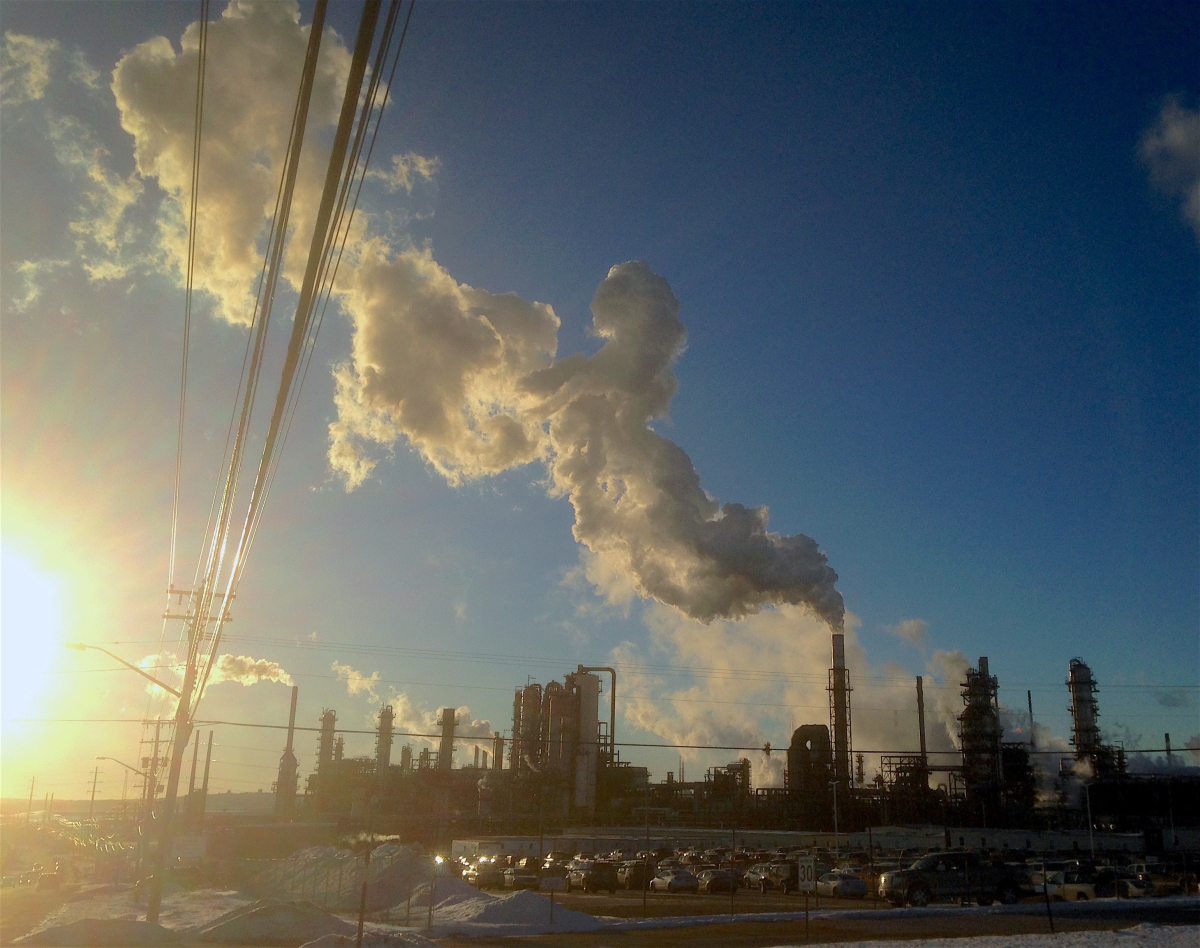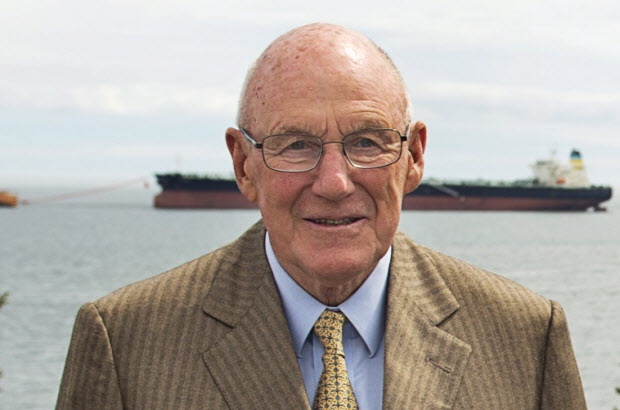Second in a six-part series on one of Canada's richest families: The House of Irvings.
The mansion of Canada’s second richest man – or fifth richest depending on the list you consult – sits atop a ridge overlooking Saint John, the largest city in New Brunswick. Located on Mount Pleasant Ave., the house is painted white with a green roof and topped by a cupola. If you stand at the foot of the drive, your view is partially blocked by a row of hedges.
Built for Kenneth Colin (KC) Irving, the founder of the Irving corporate empire, it’s now home to Arthur Irving, KC’s middle son, who controls Irving Oil Ltd., the dominant energy company on Canada’s east coast and New England. Aged 85, with a fortune valued at (US) $5.3-billion (and on Forbes’ list of richest billionaires in the world at #308), Arthur is often considered the most mercurial of KC’s three boys. One book author referred to Arthur as “so tightly wound, you fear he is going to explode” and that “he seethes nervous energy.”
“Arthur Irving doesn't have a reputation as an easy man to work with,” remarks Mark Tunney, a former editor-in-chief of the Telegraph-Journal, Saint John's Irving-owned daily newspaper. “I'm not saying he's not a nice man – some people say he is. But on the business side he gets what he wants and he doesn't really let what people feel about him get in the way at all.”

Across the street from Arthur’s compound is a small park, also owned by the Irvings, where a statue of KC stands grimly peering at his former residence. The statue was originally supposed to be erected behind the head offices of Irving Oil – the Golden Ball building in downtown Saint John – before city hall vetoed that plan.
KC was known as someone who did not suffer fools gladly, and by all accounts Arthur is a chip off of the old block. “When angered… Arthur has been known to cow subordinates, lose his temper during business negotiations and loudly berate critics,” wrote John DeMont in his 1991 book “Citizens Irving.” As chairman and largest shareholder of Irving Oil, Arthur’s combative personality is underscored by his bitter falling out with Kenneth, his oldest son and the company’s former CEO – along with some of Kenneth’s successors.

Irving Oil’s environmental and corporate citizenry track record is also generating critics – just as the company is being thrust into the national limelight because of TransCanada Corp's Energy East project, the proposed $15.7-billion pipeline that would travel 4,600 kilometres from Alberta to Saint John, carrying 1.1 million barrels a day, the continent's longest if built. Some of this oil would be refined at the Irving’s refinery – the largest in Canada with a capacity of 320,000 barrels a day – before being exported to world markets.
Yet Mark D’Arcy, a campaigner with the Council of Canadians in Fredericton, says Irving Oil seems blithely unaware of mounting opposition to Energy East and the hurdles it faces to see the pipeline realized. “I think they are their own worst enemy,” he remarks. “They have to sit down and talk to indigenous people along the pipeline route and have to sit down and come up with an alternative plan for the rural communities that are impacted by water and air pollution. And they simply haven't done that. We're sick and tired of asking for true public meetings where the audience can ask questions of these large resource companies and we’ve been refused at every opportunity.”
Energy East the brainchild of Irving Oil

In the long quest to get Energy East built, Arthur Irving and Irving Oil have played a central role.
It all began in 2011 when U.S. President Barack Obama informed then-prime minister Stephen Harper the Keystone XL pipeline, also proposed by Calgary-based TransCanada Corp, was on hold. That's when Alberta’s oil patch realized it needed a pipeline to tidewater that was not dependent on American approval. With pipelines to the west coast bogged down in problems, the industry began looking eastward.
By then, Mike Ashar, a former Suncor executive, was CEO of Irving Oil and a proponent of building a pipeline to New Brunswick. “Energy East was conceived as a desperate, I would say, Hail Mary pass when it began to become clear that Keystone XL was not going through,” says Adam Scott, a senior campaigner with Oil Change International, a Washington, DC-based environmental organization.
For Irving Oil, Energy East would guarantee a long-term source of bitumen for its refinery while turning Saint John into a global energy hub. After all, as plans for the pipeline currently stand, once the crude arrives in Saint John from Alberta, up to 280 tankers would steam into the port city every year to export it to markets. “The bigger opportunity is the potential for other investments here in Saint John to refine that oil,” notes Blaine Higgs, a former senior executive with Irving Oil and former finance minister in David Alward's provincial government.
To pave the way for Energy East, the company wants to build another tank farm in Saint John to hold six to eight million gallons of oil (which is in addition to the tank farm they already own) and a $400-million deep-water marine terminal. “(Irving Oil) will own the marine terminal,” says D’Arcy. “They also own the land where the tank farm will be built.”
Despite these grandiose dreams, the pipeline risks morphing into a hot political grenade in the debate over Canada’s commitment to slowing down climate change. After all, one estimate suggests the pipeline would allow expansion of Alberta's tar sands’ production by up to 40 per cent, and would transport one-third more barrels of oil per day than Keystone XL was supposed to. Hence, for opponents of the tar sands - Canada's fastest growing source of greenhouse gas emissions – stopping the pipeline is now an imperative. Already, 1,900 groups and individuals have applied for standing at the National Energy Board (NEB) hearings over Energy East.
However, Irving Oil, in a statement, says "we acknowledge the questions and concerns raised by a variety of stakeholders. New Brunswick is our home, and it’s the home of many of our employees and their families – no one cares more about our environment than those of us who live here."
Meanwhile, Scott feels that Irving Oil is ignoring the climate change concerns the pipeline is whipping up. “Like many companies in the oil industry they are not acknowledging the scale of the challenge or taking action to deal with (climate change),” he maintains. And on environmental issues in general, Scott observes: “I think more troubling, they don't have great record of transparency or accountability.”

Discord in the executive suites
When KC Irving began his career as a young entrepreneur in Bouctouche, a small village on the east coast of New Brunswick, one of the first products he sold was oil - first through service stations and then as a local supplier.
Oil laid the ground for his fortune, driving the conglomerate’s growth that now dominates New Brunswick and outlying regions. In 1960, KC made the bold move of building a refinery in Saint John so he could import oil, refine it and sell it through his growing network of service stations (which now numbers more than 900). Originally he partnered with Standard Oil of California, before he eventually bought them out. Profits were always plowed back into the refinery to expand its capacity.
In time, KC handed over reins of his empire to his three sons – James (JK), Arthur and Jack. After the brothers split the empire into three separate companies in 2009, Arthur ended up with control of Irving Oil. Today, along with the Maritimes, the company is a major oil supplier to the U.S. eastern seaboard and currently employs 3,000 people.
But Arthur has proven to be a problematic boss. As one source says: “Arthur does have more of a reputation of hard-nosed demeanor approach to things.”
Arthur had four children from his first marriage, and his sons Kenneth and Arthur Jr. eventually went to work for Irving Oil. But after Arthur’s bitter divorce from his wife in 1980, he forbade his sons from having any contact with their mother while they worked for him.

In 2000, Kenneth was elevated to the post of CEO, working side by side with his father. Nine years later, Kenneth’s relationship with his father was curdling: that year, plans to build a second refinery were shelved due to the global recession. Kenneth also learned his father had decided to split his fortune equally among his five children. Because of Kenneth’s management of Irving Oil, “he felt he deserved more than an equal share,” says a source.
In the summer of 2010, Kenneth abruptly left as CEO, with Arthur sending a memo to employees saying his son was departing for “personal reasons.”
To this day, the circumstances of Kenneth’s departure remain murky: one story was that he was fired out of the blue. Another that he left for health reasons and decided not to return. And a third was he had an emotional breakdown, distraught over how his father was planning to divide his fortune along with the stress of his job. Kenneth checked into the Lahey Hospital and Medical Center in Boston for a mental health respite at one juncture.
To those who know Kenneth, his departure from the company was met with dismay: He had a reputation as a sensitive and socially conscious businessman. “He is a fabulous fellow and really forward thinking,” says Sharon Murphy, a Saint John businesswoman and environmental advocate who was friends with Kenneth and his wife Tasha. Murphy says she believes Kenneth wanted to take Irving Oil in a more green direction with plans to develop renewable energy.
Clearly, Kenneth was deeply wounded by his split with his father, as seen in a 2012 decision by Bermuda’s supreme court.
By the early ‘70s, KC had moved control of his empire to a trust in the offshore haven of Bermuda to avoid paying taxes. Today, court documents indicate Irving Oil remains controlled by a trust located there as well – and sitting on at least $1-billion (Irving Oil said in a statement that "Irving Oil plays a foundational role in the local and regional economy. As a New Brunswick company, we pay all applicable taxes on all aspects of our business").
After his ouster from the company, Kenneth sought more information about the trust and its governance, even threatening legal action. Arthur responded by seeking an injunction in Bermuda against Kenneth, which included reducing an agreed-upon payout and removing Kenneth from the board of two of the family’s holding companies.
The injunction was heard in Bermuda in the summer of 2012, and the judge noted at one point: “(Kenneth) was overcome emotionally on more than one occasion when discussing the loss of his working connection with (Irving Oil) and the lack of recognition for his financial contribution to it, the ruination of his once close relationship with his father and the consequences of this for his children’s relationship with the wider family.” Kenneth admitted his legal threats were designed to elicit some communication with his father, and offered to drop the matter if he could attend a family meeting with all of Arthur’s children, have a retirement dinner with the company and participate in a family activity with his father.
In the end, the judge ruled against Kenneth. And to this day, Kenneth is not on speaking terms with his father. He now operates a data communications firm based in Seattle, although apparently lives in Toronto.

Arthur’s problems with his CEOs did not end with his son. Kenneth’s successor, Mike Ashar, lasted less than three years before leaving the company, claiming he was constructively dismissed. In a breach of contract lawsuit Ashar launched against Irving Oil last year, where he is seeking $50.2 million in damages, he referred to the “many instances of misconduct and inappropriate behavior involving members of the Irving family that created an intolerable and poisoned work environment.” The lawsuit’s allegations have not been proven in court.
Ashar was replaced by former GE executive Paul Browning, who left in the summer of 2014 after just 18 months. The position was eventually filled by Ian Whitcomb, an accountant and former partner at Deloitte LLP.
Last year, Arthur’s other son by his first marriage, Arthur Jr., left the company too, apparently not due to his own choosing. The person being groomed to run the company is Arthur’s daughter from his second marriage, Sarah, who was promoted to the post of executive vice-president and chief brand officer last year. Sarah is still in her 20s. “On the Irving Oil side it’s apparent Sarah is heir apparent there,” notes one source. “(She) is going to be the one who takes over.”

Irving Oil and the Lac-Mégantic rail disaster
While Irving Oil might be experiencing turmoil within its executive ranks, it has also found itself under scrutiny over its ethics and environmental record.
Take the Lac-Mégantic disaster. In the early morning of July 6, 2013, a freight train with 74 cars loaded with Bakken Formation crude oil derailed in the Québec town of Lac-Mégantic. The fuel exploded, destroying the downtown core, killing 47 people, making it one of the worst train disasters in Canadian history.
An investigation quickly discovered the oil was more volatile and corrosive than reflected on labels placed on the cars. While this particular train was operated by the Montreal, Maine & Atlantic Railway, the oil was heading to Irving Oil’s refinery in Saint John.
But what did Irving Oil know about the volatility of the oil arriving at its refinery from the US prior to the accident – oil they’d been refining for years? Not long after the accident, Transport Canada searched Irving Oil’s head office to find out. Lawyers suing the various companies responsible for the explosion were also curious.
Irving Oil moved quickly to help out with the disaster, spending $75 million to pay – along with 25 other companies – into a $460-million settlement fund to compensate victims.
Joel Rochon, a Toronto-based lawyer involved in one of the victim lawsuits, believes Irving Oil must have known how dangerous the fuel was. A lawsuit launched against CP Rail – one of the companies held responsible for the disaster – alleges that Irving Oil changed the labeling on the empty cars to a higher level of volatility when they sent the cars back to the US. Irving Oil did so, Rochon said in an interview, “presumably after they'd had the opportunity to evaluate the volatility of the liquids of the residuals at the bottom of the tank cars. So there's a huge discrepancy we alleged between the labeling coming in and the labeling going out. That should have raised a red flag not only with Irving but with other transporters and players along the line… Did Irving fall down on their duty? Probably.”
Irving Oil declines to discuss the Lac-Mégantic issue. Last week, Transport Canada told National Observer it had "completed its investigations as to the potential violation of the Transportation of Dangerous Goods Act in relation to the accident in Lac-Mégantic." The file was now in the hands of federal prosecutors, the department added.
For its part, the Public Prosecution Service of Canada said it could not comment on a matter "unless or until a charge is laid."
Irving Oil's environmental track record criticized
And then there is the company’s ability to pressure New Brunswick’s municipalities and provincial government.
As explained in part 1 of this series, Irving Oil is at the center of a controversy surrounding a 90 per cent tax concession over 25 years it received for a liquified natural gas (LNG) terminal it co-owns on the outskirts of Saint John.
But this is not the only controversy surrounding that LNG terminal. Last year, the CBC discovered the company built a pipeline on the property to facilitate importing oil – without getting permission from the province’s Energy and Utilities Board beforehand, which it's supposed to do (the company has since applied retroactively and been granted approval). Irving Oil told the Board it mistakenly felt permission was not required because the entire pipeline was contained on its own property.
Then there is Irving Oil’s oil-by-rail terminal in Saint John. Built four years ago by the company to take advantage of western crude brought to the city by train, the terminal is reportedly Canada’s largest, and has supplied as much as half of the oil processed by the refinery.
Yet the CBC reported in December that despite causing no shortage of traffic and equipment problems for the city’s firefighters, the terminal pays a mere $19,300 in annual property tax – about half the $37,000 paid by a Tim Hortons restaurant that stands across the street from it. “I think this council feels we have to get more tax dollars out of industry, which includes the Irvings, then we have been getting for years,” remarks Saint John city councilor Gerry Lowe.
And then there are the environmental problems.
Last year, for example, the Reuters news agency discovered that Irving Oil has logged at least 19 accidents classified by regulators as “environmental emergencies” at its existing facilities in eastern Canada since 2012, including three that drew warnings for delayed reporting. Irving Oil’s refinery and its storage terminals have had environmental emergencies ranging from petroleum spills as big as 3,000 barrels, to smaller incidents such as refinery emissions of sulfur dioxide exceeding permitted levels.
In 2013, New Brunswick’s Department of the Environment issued Irving a warning for taking more than a full day to report a storage tank leak of about 132 gallons of crude.
Irving Oil noted in a statement that "environmental responsibility is key to everything we do. The term referred to in the Reuters story provided no reference to quantities. Irving Oil is required and it is our practice to report every single occurrence, no matter how small. Irving Oil is very proud of its record of environmental responsibility."
Gordon Dalzell, the head of a local environmental group, Saint John Citizens’ Coalition for Clean Air, worries about the volatile organic compounds (VOCs) that Irving Oil’s refinery emits into the air – in particular the carcinogen benzene (VOCs help create smog, which is hazardous to health). Provincial monitors have found that benzene levels in Saint John are higher than the maximums in Ontario (New Brunswick does not have an air quality standard for benzene). Overall, air monitors in the city reveal a plethora of toxic chemicals are released into the air by the refinery – a total of 376 tonnes of VOCs in 2014 alone. “We have been pushing the (environment) ministry and the refinery to install the best level of control technology money can buy to control VOCs,” says Dalzell. “But when you look at refinery there are literally thousands and thousands of sources of these VOCs.”
Such emissions are one reason the air in Saint John is considered so hazardous. A 2009 report by the Conservation Council of New Brunswick found that lung cancer rates in Saint John were 40 to 50 per cent higher than in Fredericton and Moncton. Inka Milewski, one of the co-authors of the study, points out “that smoking rates among males and females in Saint John were lower than the provincial rate. Which was a surprise to me. And lower, in fact, than the national rate.” Milewski attributes the high cancer rates to industrial pollutants. “This is a community that has suffered for decades with bad air quality.”
Meanwhile, Reuters also revealed that the vapor recovery equipment at the Irving Oil’s marine terminal was shut 37 per cent of the time between December 2012 and March 2015 due to mechanical problems, as millions of barrels of gasoline were loaded onto ships. The equipment was designed to capture VOCs and other air pollutants. “Some periods… they were not working for 80 per cent of the time. In fact, that meant that these VOCs were escaping,” says Dalzell. “We didn’t know that.”
One person who has studied aspects of Irving Oil’s environmental track record is Catherine Abreu, who works for the Ecology Action Centre in Halifax. Last year, she produced a study comparing Irving Oil’s refinery to two refineries along the route of the proposed Energy Easy pipeline – both of which are in Québec, one run by Suncor and the other by Texas oil giant Valero. “Findings show that Irving Oil's environmental record at its Saint John refinery is significantly worse than the environmental records of Suncor and Valero refinery operators,” her report concluded.
In an interview, Abreu summarizes Irving Oil’s history of environmental management as “careless… I found that when you compared the (three refineries) there were significantly more incidences and reported spills and leakages for the Saint John refinery for the last 10 years than for the others. And the incidences recorded are generally more significant.”
Andy Carson, Irving Oil's spokesperson, said in a statement that "As far back as 2002 our Company received the US Environmental Protection Agency’s Clean Air Award, the first oil company to ever receive this recognition. To build on this achievement, we’ve planned and executed over $300 million in environmental investments at our refinery in the last decade alone. We’re also the only industrial facility in North America located immediately next to a flourishing Ducks Unlimited marshland and green space, a relationship we are very proud of."
Meanwhile, Irving Oil has apparently misled regulators about pollution issues. New Brunswick’s Department of Environment approved its 145,000 barrel-per-day oil-by-rail terminal in 2012 without requiring the company to conduct an environmental impact study after Irving Oil claimed the terminal would not trigger new odors or emissions. Yet, as it turns out, the terminal actually emits up to 181 tonnes of VOCs annually and has generated growing complaints from locals about strong smells.
The bad news got worse this past weekend when Reuters reported that Irving Oil’s refinery spewed an excessive amount of ash-like catalyst into Saint John at least a dozen times since 2010. The concoction of sand and metal compounds, used in the production of gasoline, affects human health. Between August 2010 and December 2015, records show the refinery had repeated operational problems that triggered the releases of the substance, which sometimes left surrounding homes, vehicles and backyards coated by a gritty dust. Prolonged exposure has been linked by health experts to potential lung damage.
All of this alarms opponents of Energy East. After all, they fear the consequences of oil spills in the Bay of Fundy – considered one of the most pristine natural habitats for marine life in the world. “There is already a very large opposition to building a tank farm and marine terminal in the existing rural population,” explains Mark D’Arcy of the Council of Canadians, before adding that Irving Oil gives off the impression of not being overly concerned.
Requests for interviews from someone from Irving Oil were declined by the company.
Arthur Irving did give a rare interview to The Financial Post, which was published last week, in a story that portrayed him and Irving Oil in a positive light. Although Irving extolled the virtues of Energy East, he pointedly refused to discuss personal family matters or his and the company's financial situation. “We are not interested in showing off what we have or we don’t have,” he told the newspaper. “We just do what we have to do and it’s been a lot of fun and it still is.”
Coming next in National Observer: Playing Hardball the J.D. Irving Way






Comments
You know what they say. Power corrupts. Looks like this is no exception. Nice work, Bruce! Makes me cry to think that the Irving's pet project, Energy East, will facilitate the extraction of even more dirty oil.
Always enjoy your stuff Bruce !
If you ever need something else to sink your teeth into, let me suggest the history of the hydro electric utilities in Ontario. Its an interesting story with many twists and turns over the course of several decades with several governments of different stripes contributing to the current situation. Ive seen several aspects and micro issues covered but no one has actually told the tale of how they got to where they are today !
I think it's particularly relevant given the greener future we envision and the developing alternatives that will be available even at the end user level !
Have a great day
Unions become bad only when they cease to represent the workers corrupt leaders, infiltrated by the company A good union is one that represents the Workers would not increase wages so much that it runs the company out of business because it's not in their self-interest to do so they'd be out of a job It is in the interest of employers to make it appear as if the union is hurting the company though regardless of whether it is or not
I love that place! I went there every Saturday as a child and still pop in every once in a That poor chicken, being chased all the By
The pipeline carrying western Canadian natural gas that during the 1960s revolutionized Ontario's energy base for industrial and home heating, from oil tanker truck dependency , was failing to produce adequate profits before the turn of the century as natural gas prices shrunk. Oil would again make the pipeline profitable, came the immediate response of corporate thinkers.
It has always been my understanding that this old, thin-walled pipeline would not safely transport dilbit across or under the dozens of Ontario's or Quebec's rivers, streams and lakes.
Perhaps the author of this piece about the Irving family's New Brunswick could provide a companion piece detailing the recent history of spillage incidents along one firm's oil pipeline firm in Ontario, and nearby Michigan Not under the control of a family's fortune like New Brunswick, government in Ontario has suddenly come under the authoritarian control of something just as dangerous that does not even pretend to believe in climate change. With a national political party in power now threatening, its leadership equally in Denial of the threat to all life in the biosphere, a piece about our vulnerability to political corruption at both ends of "Canada East" is surely needed?
As Carl Sagan pointed out two decades back, Denial is a psychiatric term.